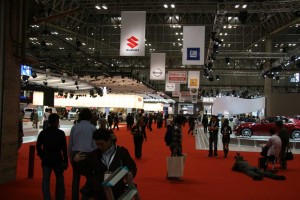
The sharp downturn in attendance at the Tokyo Motor Show only underscored the steady decline of the Japanese auto market.
The auto industry has been at the heart of the Japanese economy since the 1950s. But for perhaps the first time ever, many Japanese experts think that, production-wise, the country’s auto industry is headed for an irreversible decline that will become quite evident in the not too distant future.
(Japanese car sales did post a modest upturn, in November, but that was largely the result of hefty new government incentives. For more on that story, Click Here.)
A steadily aging population that is less interested in purchasing new vehicles, and the steady rise of China’s auto industry, are serving as the backdrop for this anticipated decline. The long recession has left car sales in Japan stagnant and nobody I encountered during my visit to Japan believes the situation is going to turn around any time soon.
Indeed, Toyota, the market share leader in Japan by a huge margin, with 46 percent of the total Japanese market, announced that it planned to shut down 300 dealerships across its home market and re-deploy the personnel to service international markets where the opportunities for growth look more promising.
The decision to close the dealership was a reflection of the steady aging of Japanese society. By 2030, something like 40 percent of all Japanese will be over the age of 65. Immigration remains a sensitive subject for Japanese society, as a whole, and the Japanese automakers have come to rely on immigrants of Japanese descent, from Brazil,who over the last two decades have returned to Japan to look for work.
Relatively few of the immigrants from Brazil have obtained Japanese citizenship and most are employed under temporary work permits that require them to change jobs every few years — even if they have been in Japan for 20 years.
Meanwhile, younger Japanese are less interested in automobiles than their parents and grandparents, according to observers.
A study done by the Japanese Auto Workers union, which represents both salaried and blue-collar workers, indicates that new university graduates also find jobs in the auto industry less appealing today.
With the Japanese demand for new vehicles declines, Japanese are talking about the inevitable decline of production in Japan. Right now an agreement between Japanese manufacturers and the Japanese Auto Workers union holds Japanese annual production at around 10 million units.
About 60 percent of the production is exported to other countries around the world, including the US, which absorbs close to one third of all Japanese automotive exports.
A decline in Japanese auto production, including production for exports, are bound to decline, noted Hiroyuki Ohkita, a member of the JAW’s executive committee and director of the union’s planning and general affairs group.
Ohkita, speaking through an interpreter, said the union would prefer to have Japanese autoworkers trim production slowly. But he wasn’t optimistic about reversing the cuts since Japanese automakers are putting pressure on the union to agree to cut production at their factories in Japan.
Shin Hosaka, director of the automobile division inside the Ministry of Economy Trade and Industry, said the decline of automobile production in Japan is inevitable at this point. The trend now is for automakers to shift more production to other countries around the Pacific Rim, and especially to China, where production is expanding rapidly.
For the Japanese carmakers such as Toyota, it also means they will no longer be able to depend on robust sales in their home market and instead will have to compete for sales all over the world where the competition tends to be far more fierce.
